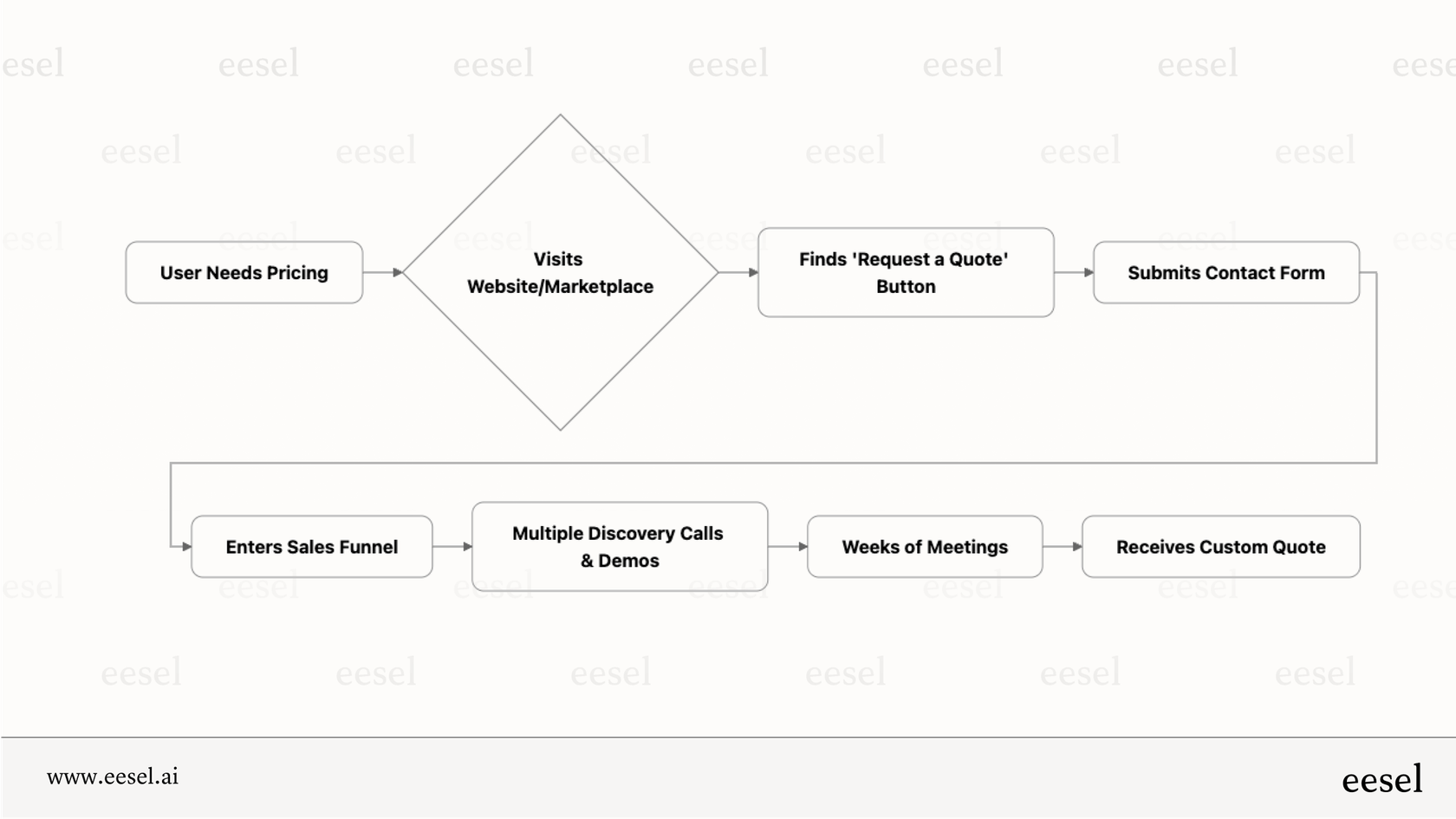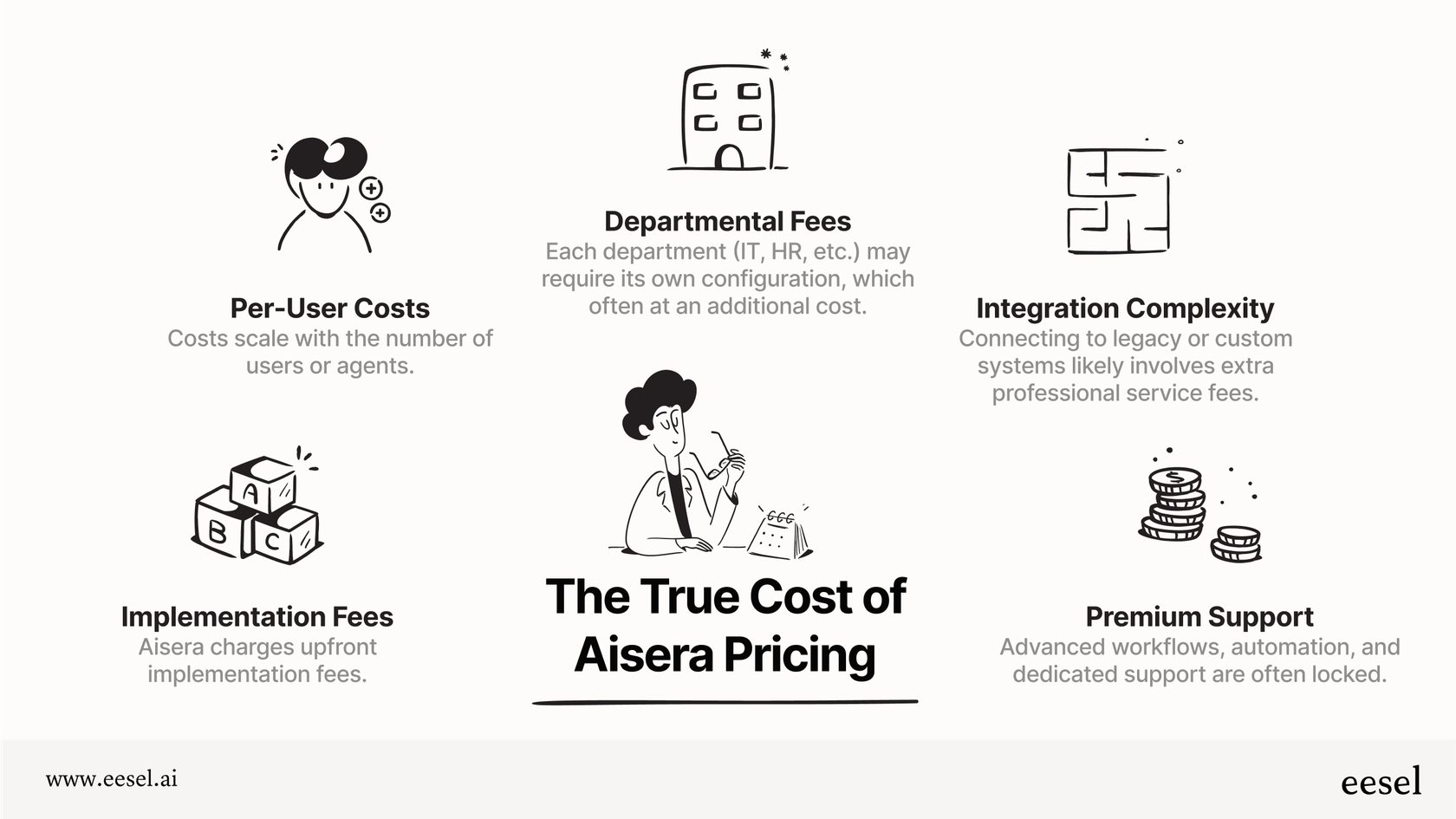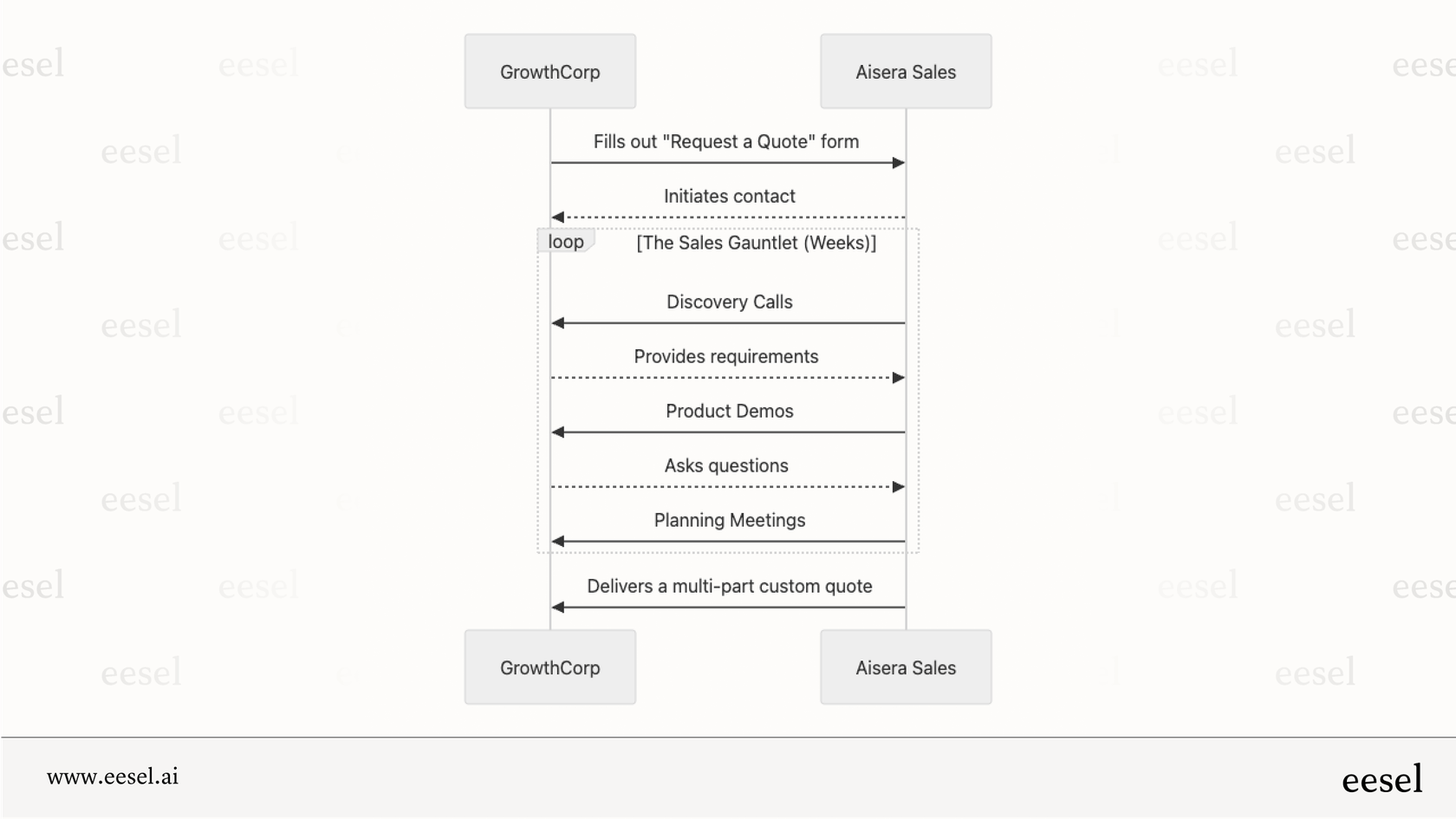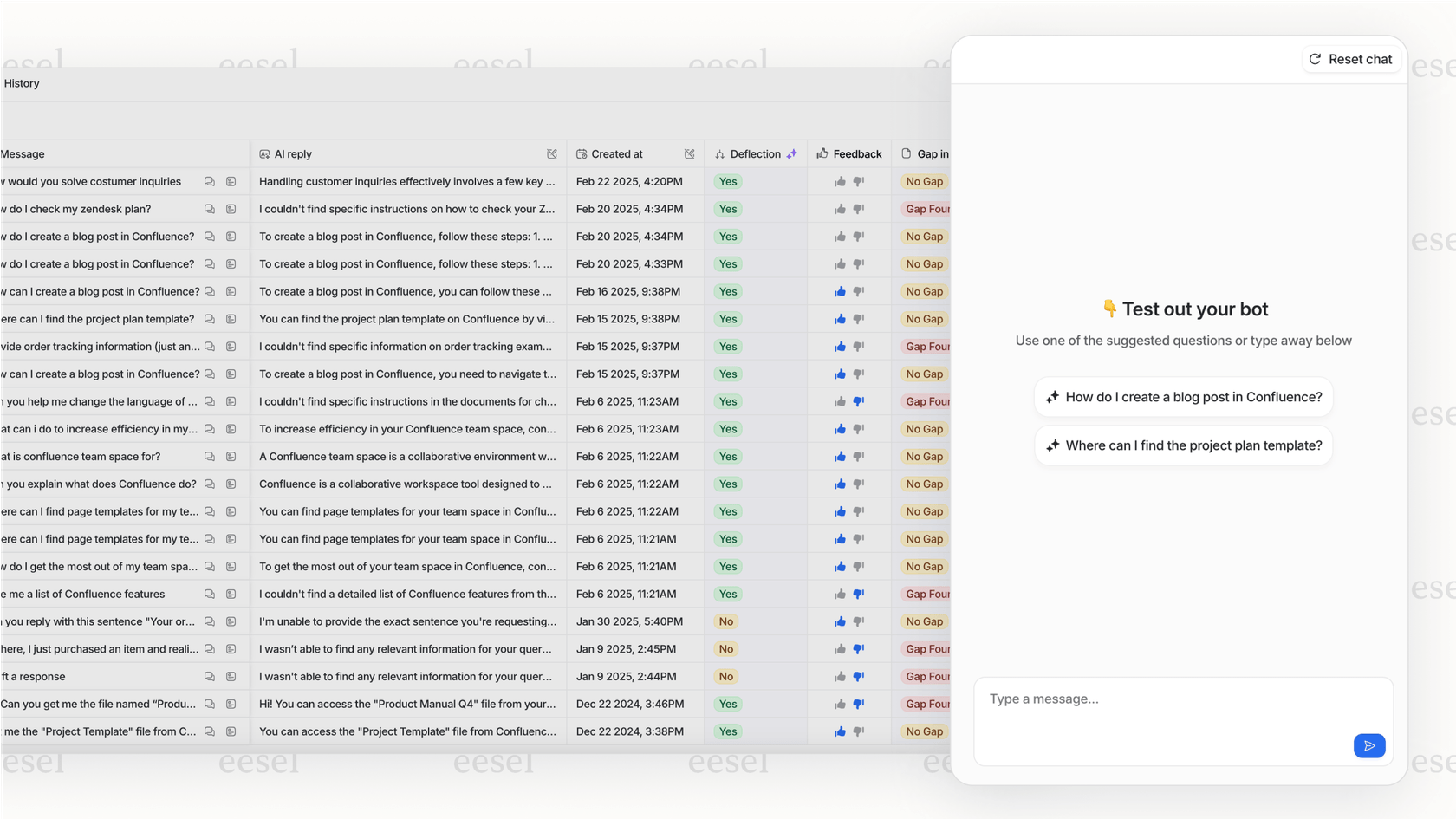
So, you’re looking into Aisera. You’ve heard it’s a powerful AI platform for automating all sorts of work in IT, HR, and customer support. It talks a big game with generative AI and a huge library of pre-built workflows. The only problem? Trying to figure out the Aisera pricing is a job in itself and even review sites like Trustradius all point you to the same place: a "Request a Quote" button. It’s a dead end that makes it almost impossible to budget or compare your options.
This guide is here to clear up the confusion around the Aisera pricing model. We'll dig into the available information, look at what drives the cost up, and figure out if it's worth the investment. We’ll also see how this old-school enterprise model stacks up against modern platforms like eesel AI, which offers clear, usage-based pricing that grows with you.
What is the Aisera pricing structure?
Aisera uses the classic "contact us for pricing" playbook, which means you won't find any standard plans or prices listed publicly. Instead of a pricing page, you get funneled into booking a demo or requesting a custom quote. This is a deliberate move, common among companies targeting massive enterprises with very specific needs.
The main reason they do this is that the final price is custom-built for every customer. Your cost will depend on the exact modules you pick, how many users or agents need access, how tricky the integrations are, and any service level agreements (SLAs) you negotiate.
Interestingly, while Aisera avoids listing prices on its own website, some pricing details appear on the Microsoft Azure Marketplace, likely because that platform requires disclosure. For example, an AI Service Desk plan for up to 1,000 users is listed at $200,000 per year, while another for up to 10,000 users costs $1.2 million. These are one-time annual payments and are not shown anywhere on Aisera’s official site. This suggests that pricing does exist but is selectively disclosed through third-party platforms, adding to the overall lack of transparency.
For you, this lack of transparency is a huge pain. It stops you from making quick decisions because you can't easily compare the total cost against other tools without getting tangled in a long sales process. You’re left guessing what the price tag might be until you’re already deep in conversation with their sales team.

A breakdown of likely Aisera pricing tiers and plans
Since Aisera doesn't publish its pricing, we’ve pieced together an educated guess based on its product descriptions (like AI Service Desk and Agent Assist) and how enterprise software is usually sold. This should give you a general idea of what you might be getting into.
Here’s a rough sketch of what their pricing tiers could involve.
| Feature | Professional (Likely) | Enterprise (Likely) | Custom (Likely) |
|---|---|---|---|
| Pricing Model | Quote-based (Per-user/domain) | Quote-based (Higher per-user) | Custom quote |
| Target User | Single departments, mid-size orgs | Large, multi-department enterprises | Global companies with unique security/SLA needs |
| Core Features | Conversational AI, Ticket AI | All in Pro + advanced workflows, more integrations | All in Enterprise + custom models, dedicated support |
| Setup Fee | Required | Required (Higher fee) | Custom |
| Support | Standard support | Premium 24/7 support | Dedicated Account Manager |
The point here isn't the exact details of these made-up plans, but the uncertainty of it all. To get a real number, you have to sign up for a sales cycle that can drag on for weeks with demos, calls, and meetings before you ever see a price.
Hidden costs and other factors that influence Aisera pricing
The final quote you get from Aisera will be based on more than just a simple license. If you're seriously considering this platform, you need to be ready for several other costs that can make the final number much bigger.
-
Implementation & Setup Fees: It’s confirmed on Trustradius that a setup fee is required. For tools of this scale, these one-time fees can run anywhere from a few thousand to tens of thousands of dollars just to get the system configured and running.
-
Per-User or Per-Agent Costs: This is standard for a lot of software. The more people on your team using the platform, the higher your bill. This model can get expensive fast, especially if your support or IT teams are growing.
-
Per-Domain or Department Fees: Aisera often highlights its ability to work across different departments like IT, HR, and Finance. It’s very likely they charge extra to set up the tool in each new department, since each one needs its own unique setup, workflows, and knowledge.
-
Integration Complexity: Aisera says it has over 400 integrations, but connecting it to your company’s unique or older systems will almost certainly cost you extra in professional services. The more complicated your tech setup, the more you can expect to pay.
-
Advanced Features & Workflows: Access to their library of 1,200+ pre-trained workflows is a big part of their pitch. But it’s common for vendors to hide the most valuable automation and features behind their most expensive plans.
-
Support & Training Packages: You'll probably get basic support included, but if you want premium 24/7 help or a dedicated person to call when things go wrong, that will cost extra. This is often calculated as a percentage of your total contract value.

The limitations of the opaque Aisera pricing model
The "contact us for a quote" model causes some real headaches for teams trying to find the right software. It's an old-school sales tactic that just doesn't work for most fast-moving businesses today.
Here are the biggest drawbacks:
-
Budgeting is a guessing game: You can't plan your expenses or create a reliable budget when you have no idea what the starting price is. This forces you into a sales cycle just to see if the tool is even in your price range.
-
It slows everything down: You can try and compare most modern tools in an afternoon, but Aisera’s model grinds your evaluation to a halt. You can’t quickly see if it’s worth the money compared to competitors, which delays the whole decision.
-
You can't plan for growth: You have no idea how your costs will change as your company gets bigger. What happens if you hire 10 more support agents or want to use the tool for the HR team? Will your bill double? It's impossible to know ahead of time.
-
The total cost is a mystery: The price you're first quoted is rarely the full story. It’s often padded with required fees for implementation, training, and premium support that aren't mentioned upfront.
This is exactly why so many teams are switching to platforms like eesel AI. With eesel AI, every cost is laid out on a public pricing page. You get predictable scaling and a clear picture of your investment from the very beginning.
Calculating your potential Aisera costs
To make this real, let’s imagine a company called "GrowthCorp." They have a 30-person team split between customer support and IT, and they want to automate their simple, repetitive support requests.
Here’s the journey they would probably go through with Aisera:
-
First Contact: GrowthCorp's team lead fills out the "Request a Quote" form on Aisera's site.
-
The Sales Gauntlet: Over the next few weeks, they sit through multiple discovery calls, demos, and planning meetings. The sales team digs into their ticketing system, knowledge bases, and automation goals for both departments.
-
The Potential Quote: The quote they finally get isn't just one number. It’s broken down into several parts: 30 User Licenses: A recurring fee, maybe somewhere between $80 to $150 per user each month.
-
One-Time Implementation Fee: A mandatory setup charge, possibly between $10,000 and $20,000.
-
Premium Support Package: An annual fee to make sure they can get help quickly when they need it.
The result? GrowthCorp's first-year cost could easily top $50,000. But more importantly, they won't know that number for weeks, which stalls their project and pushes back any chance of improving their team's efficiency.

A transparent alternative to Aisera: eesel AI's pricing model
In stark contrast to Aisera's complicated and secretive model, eesel AI offers a simple, clear, and modern way to price AI. There are no secrets and no sales hoops to jump through.
Here’s what makes eesel AI different:
- Clear, public pricing: The eesel AI pricing page spells out exactly what you get and what it costs. No guesswork needed.
| Plan | Billing / month | Bots | AI Interactions/mo | Key Unlocks |
|---|---|---|---|---|
| Team | $239 | Up to 3 | Up to 1,000 | Train on website/docs; Copilot for help desk; Slack; reports. |
| Business | $639 | Unlimited | Up to 3,000 | Everything in Team + train on past tickets; MS Teams; AI Actions (triage/API calls); bulk simulation; EU data residency. |
| Custom | Contact Sales | Unlimited | Unlimited | Advanced actions; multi-agent orchestration; custom integrations; custom data retention; advanced security / controls. |
-
Pay for usage, not people: This is a big one. Pricing is based on how much you use the AI (the number of replies and actions), not how many people are on your team. A team of 10 or 50 agents can use the same plan, which makes costs predictable and affordable for growing teams.
-
Everything's included: All the core tools AI Agent, AI Copilot, AI Triage, AI Internal Chat, and the AI Chatbot are part of every plan. You don’t have to worry about getting hit with extra fees for features you thought were included.
-
No hidden setup fees: eesel AI is built to be self-serve and easy to get going. There are no mandatory, multi-thousand-dollar implementation charges.
-
Test before you buy: This unique feature lets you test the AI on your past tickets to see how many inquiries it could deflect and how accurate it would be. You can see the potential return on your investment before you even start a trial, which takes all the risk out of the decision.

Is Aisera’s pricing worth it?
Look, Aisera is a powerful platform built for big companies, but its value is hidden behind a frustrating and murky pricing model. The whole quote-based process slows you down, makes budgeting a nightmare, and can lead to a surprisingly high total cost.
For teams that value speed, clear ROI, and predictable spending, a more modern approach is a much better fit.
Platforms like eesel AI offer enterprise-level automation with the kind of transparent, flexible, and scalable pricing that today's support and IT teams need. You can see the value, test the impact, and grow your team without wondering what the bill will look like next month.
See the pricing for yourself, book a demo, or directly start a free trial today.
Frequently asked questions
You should budget for significant additional costs beyond the license. These almost always include a mandatory one-time setup fee, extra charges for complex integrations, and premium support packages that are required for timely help.
Aisera pricing is likely tied to per-user licenses, so your costs will increase directly with your headcount. Adding the platform to new departments like HR or finance will also likely incur separate setup and licensing fees, making scaling unpredictable.
Aisera targets large enterprises with a custom-built solution, so they don't offer standard plans. This "contact us" model requires you to engage with their sales team to get any numbers, which prevents quick comparisons and budgeting and makes it impossible to find a standard price list.
Like most enterprise software that requires extensive setup, you can expect to be locked into an annual or multi-year contract. Shorter-term or monthly options are highly unlikely given the hands-on nature of their implementation process.
Share this post

Article by
Kenneth Pangan
Writer and marketer for over ten years, Kenneth Pangan splits his time between history, politics, and art with plenty of interruptions from his dogs demanding attention.







